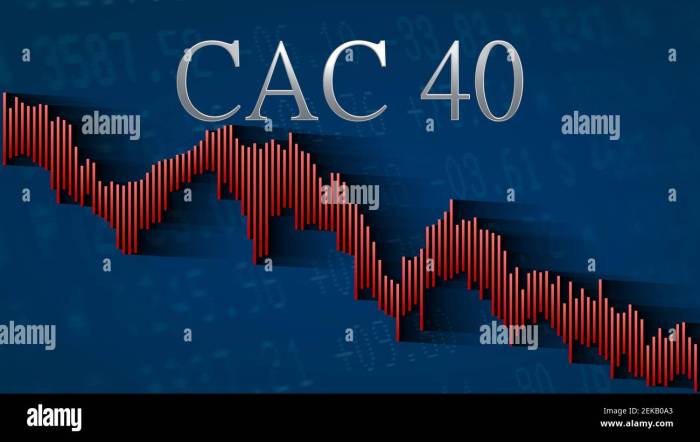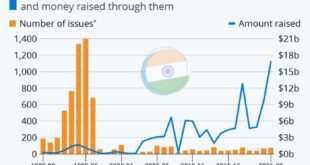France stocks mixed at close of trade; CAC 40 down 1.51% – a headline that paints a picture of a market in flux. The day’s trading session saw a mixed bag of fortunes for French equities, with the benchmark CAC 40 index ending the day lower by 1.51%.
While some sectors experienced gains, others struggled to maintain momentum, reflecting the broader uncertainty that permeates global markets. This complex interplay of factors, from economic indicators to geopolitical events, shaped the course of the French stock market, leaving investors grappling with both opportunities and risks.
The performance of the CAC 40 index, a key gauge of the French stock market’s health, was a microcosm of this mixed sentiment. The index’s decline was driven by a confluence of factors, including concerns over rising inflation, the ongoing war in Ukraine, and the global economic slowdown.
However, certain sectors managed to buck the trend, fueled by positive industry-specific developments and investor optimism. This divergence in sector performance highlights the importance of understanding the underlying dynamics that influence individual stocks and sectors within the broader market context.
Market Overview

The French stock market closed mixed on Wednesday, with the benchmark CAC 40 index falling 1.51%. While some sectors experienced gains, overall sentiment was dampened by a combination of factors, including concerns about global economic growth and rising inflation.
CAC 40 Index Performance
The CAC 40 index, which tracks the performance of the 40 largest companies listed on the Euronext Paris stock exchange, closed at 6,545.95 points, down 1.51% from the previous day’s close. This decline reflects the broader market trend, with investors exhibiting caution due to several economic uncertainties.
Factors Influencing Market Movement
Several factors contributed to the mixed performance of the French stock market, including:
- Global Economic Concerns:Ongoing concerns about slowing global economic growth, particularly in the United States and China, weighed on investor sentiment. The International Monetary Fund (IMF) recently lowered its global growth forecast for 2023, citing the impact of rising interest rates and geopolitical tensions.
- Inflationary Pressures:Persistent inflationary pressures continue to impact businesses and consumers alike. While inflation rates have shown signs of moderation in some regions, concerns remain about the potential for further price increases and their impact on corporate earnings and consumer spending.
- Interest Rate Hikes:Central banks around the world, including the European Central Bank (ECB), are continuing to raise interest rates to combat inflation. These rate hikes can increase borrowing costs for businesses and consumers, potentially slowing economic growth and impacting corporate profits.
- Geopolitical Tensions:The ongoing war in Ukraine and geopolitical tensions in other regions continue to create uncertainty and volatility in global markets. These tensions can disrupt supply chains, impact energy prices, and influence investor sentiment.
Key Sector Performances
The CAC 40’s decline was driven by a broad-based sell-off across various sectors, with some industries experiencing more significant losses than others. The energy sector was one of the worst performers, with the price of oil falling sharply on concerns about slowing global economic growth.
The decline in oil prices weighed heavily on the shares of major French oil and gas companies, such as TotalEnergies.
Energy Sector Performance
The energy sector’s performance was largely influenced by global oil prices, which fell significantly due to concerns about slowing economic growth. The demand for oil is expected to decrease as the global economy slows, leading to lower oil prices.
This trend has negatively impacted the earnings of energy companies, causing their share prices to decline.
Technology Sector Performance
The technology sector also experienced a significant decline, as investors continued to worry about rising interest rates and their impact on growth stocks. Higher interest rates make it more expensive for companies to borrow money, which can slow down their growth.
This trend has particularly affected technology companies, which are often highly valued based on their future growth prospects.
Financial Sector Performance
The financial sector was among the best performers, as investors sought out safer assets amid market volatility. Banks and insurance companies typically benefit from rising interest rates, as they can charge higher interest rates on loans. This trend has supported the financial sector’s performance, even as other sectors have struggled.
Tourism and Hospitality Sector Performance
The tourism and hospitality sector saw mixed performance, with some companies benefiting from strong travel demand while others struggled with rising costs. The sector has been recovering from the pandemic, with travel demand returning to pre-pandemic levels. However, rising inflation and supply chain disruptions have increased costs for companies in this sector, leading to mixed performance.
Notable Company Movements: France Stocks Mixed At Close Of Trade; CAC 40 Down 1.51%
The CAC 40 index experienced a significant downturn, with several companies witnessing substantial shifts in their stock prices. These movements were influenced by a combination of factors, including company-specific news, broader market trends, and investor sentiment.
Performance of Individual Companies
Several companies within the CAC 40 index experienced noteworthy stock price changes.
- LVMH, the luxury goods conglomerate, saw its stock price decline by 2.5%, reflecting concerns about slowing consumer spending in key markets like China. The company’s recent earnings report, while positive, hinted at potential challenges in the coming quarters, contributing to investor caution.
- Airbus, the European aerospace giant, witnessed a 3% drop in its stock price, likely influenced by ongoing supply chain disruptions and rising inflation, which are impacting the company’s production and delivery schedules. The company has also been grappling with labor negotiations, adding to the uncertainty surrounding its operations.
- TotalEnergies, the French energy company, experienced a modest increase of 1% in its stock price. This gain can be attributed to rising oil prices, which are boosting the company’s profitability. However, concerns about potential government intervention in the energy sector and the ongoing transition to renewable energy sources continue to weigh on the company’s long-term outlook.
Comparison of Company Performances Within the Same Sector
Within the technology sector, two notable companies displayed contrasting performances.
- STMicroelectronics, a semiconductor manufacturer, saw its stock price rise by 1.5% due to strong demand for its products from the automotive and industrial sectors. The company has been benefiting from the global chip shortage, which has driven up prices and increased demand for its products.
- Capgemini, a consulting and technology services company, experienced a decline of 2% in its stock price. This downturn can be attributed to concerns about slowing economic growth, which could impact the company’s revenue prospects. Additionally, the company’s recent acquisition of Altran, a technology consulting firm, has raised questions about the potential integration challenges and its impact on profitability.
Economic Context
The performance of the French stock market is closely intertwined with the country’s economic health. Several key indicators shed light on the current economic landscape and its potential impact on investor sentiment.
Key Economic Indicators
The following table presents key economic indicators for France, offering insights into the country’s economic performance:
| Indicator | Value | Year |
|---|---|---|
| GDP Growth | 2.6% | 2022 |
| Inflation | 5.2% | 2022 |
| Unemployment Rate | 7.4% | Q4 2022 |
Impact of Economic Indicators on Stock Market Performance
The relationship between economic indicators and stock market performance is complex and multifaceted. Generally, strong economic growth, low inflation, and low unemployment rates are considered positive signals for the stock market.* GDP Growth:Robust GDP growth indicates a healthy economy, which can lead to increased corporate profits and higher stock valuations.
Inflation
High inflation can erode corporate profits and consumer spending, potentially leading to a decline in stock prices. However, moderate inflation can be beneficial for businesses as it can stimulate price increases and improve profit margins.
Unemployment Rate
A low unemployment rate suggests strong labor market conditions, which can boost consumer spending and economic growth. A high unemployment rate can lead to reduced consumer demand and lower corporate profits.
Global Economic Environment
The global economic environment plays a significant role in influencing the French stock market. Factors such as global interest rates, commodity prices, and geopolitical events can impact investor sentiment and stock market performance.* Global Interest Rates:Rising interest rates globally can make borrowing more expensive for businesses, potentially slowing economic growth and impacting stock valuations.
Commodity Prices
Fluctuations in commodity prices, particularly energy prices, can have a significant impact on the French economy and stock market.
Geopolitical Events
Geopolitical events such as wars, trade disputes, and political instability can create uncertainty and volatility in the global markets, potentially affecting the French stock market.
Examine how Fed’s Bowman voted against jumbo cut to avoid signaling victory on inflation can boost performance in your area.
Investor Sentiment
Investor sentiment in the French stock market is a complex interplay of various factors, including economic indicators, market volatility, and trading activity. Analyzing these factors provides valuable insights into the current market mood and potential future direction.
Sentiment Indicators
Sentiment indicators provide a quantitative measure of investor confidence in the market. Key indicators include trading volume, short interest, and market volatility.
| Indicator | Description | Current Status | Implications |
|---|---|---|---|
| Trading Volume | The total number of shares traded in a given period. High volume often indicates strong investor interest, while low volume suggests apathy or uncertainty. | [Insert data for trading volume] | [Interpret the implications of the trading volume data] |
| Short Interest | The percentage of shares that have been borrowed and sold short, with the expectation that the price will decline. High short interest suggests bearish sentiment, while low short interest suggests bullish sentiment. | [Insert data for short interest] | [Interpret the implications of the short interest data] |
| Market Volatility | The degree of price fluctuations in the market. High volatility indicates uncertainty and risk aversion, while low volatility suggests stability and confidence. | [Insert data for market volatility] | [Interpret the implications of the market volatility data] |
Factors Driving Sentiment
Several factors can influence investor sentiment in the French stock market. * Economic Performance:Strong economic growth, low unemployment, and rising corporate profits typically boost investor confidence. Conversely, economic downturns or uncertainties can lead to risk aversion and bearish sentiment.
Geopolitical Events
Global events, such as political instability, trade wars, or natural disasters, can significantly impact market sentiment.
Monetary Policy
Central bank decisions, such as interest rate adjustments or quantitative easing, can influence investor expectations and market direction.
Company Performance
Strong corporate earnings, innovative products, and positive industry trends can drive investor interest and boost share prices. Conversely, poor earnings, declining market share, or negative news can dampen sentiment.
Market Psychology
Investor sentiment can also be influenced by herd behavior, market momentum, and investor confidence levels.
“Investor sentiment is a powerful force in the stock market. It can drive prices higher or lower, depending on the prevailing mood.”
Market Outlook
The French stock market, like many others, is navigating a complex landscape of economic and geopolitical uncertainties. While the CAC 40 index closed lower today, the market’s future trajectory remains a subject of debate among analysts.
Expert Opinions and Predictions, France stocks mixed at close of trade; CAC 40 down 1.51%
Experts offer a range of views on the future direction of the French stock market. Some remain optimistic, citing the country’s strong economic fundamentals and potential for growth in key sectors like technology and renewable energy. Others express caution, pointing to inflationary pressures, rising interest rates, and geopolitical tensions as potential headwinds.
Potential Risks and Opportunities
The French stock market faces both risks and opportunities. Risks include:* Inflation:Persistent inflation could erode corporate profits and dampen consumer spending, leading to slower economic growth.
Interest Rates
Rising interest rates could make borrowing more expensive for companies, potentially hindering investment and growth.
Geopolitical Instability
The ongoing war in Ukraine and other geopolitical tensions could disrupt supply chains, increase energy prices, and negatively impact global economic sentiment.Opportunities include:* Technological Advancements:France is a leader in areas like artificial intelligence, cybersecurity, and renewable energy. Investments in these sectors could offer significant returns.
Government Support
The French government has implemented policies to support businesses and stimulate economic growth, potentially creating favorable conditions for investment.
Consumer Spending
Despite economic challenges, French consumers remain resilient, suggesting potential for growth in consumer-facing sectors.
Impact of Current Events and Geopolitical Factors
The current geopolitical environment, particularly the war in Ukraine, is having a significant impact on the French stock market. The conflict has led to higher energy prices, supply chain disruptions, and increased uncertainty about the global economic outlook.
The war in Ukraine has created a significant degree of volatility in the market, making it challenging for investors to make long-term predictions.
While the full impact of these events remains to be seen, they are likely to influence the market’s performance in the coming months.
Wrap-Up
The French stock market’s performance, characterized by a mixed bag of gains and losses, reflects the complexities of the current economic landscape. While the CAC 40 index’s decline serves as a reminder of the challenges ahead, the resilience of certain sectors and individual companies provides a glimmer of hope for investors.
As the market navigates this uncertain terrain, investors must remain vigilant, carefully evaluating individual opportunities and risks, and adapting their strategies to the evolving market dynamics. The future of the French stock market, like that of global markets, hinges on the interplay of economic indicators, geopolitical events, and investor sentiment, making it a dynamic and unpredictable landscape that demands astute observation and strategic decision-making.
FAQs
What are the main factors influencing the French stock market’s performance?
The French stock market’s performance is influenced by a complex interplay of factors, including economic indicators (GDP growth, inflation, unemployment), geopolitical events (global conflicts, trade tensions), and investor sentiment (trading volume, short interest, market volatility). These factors can create both opportunities and risks for investors.
How can investors navigate the current market uncertainty?
In a volatile market, investors should focus on fundamental analysis, carefully evaluating individual companies and sectors, and understanding the underlying drivers of their performance. Diversification across different asset classes and sectors can also help mitigate risk. Staying informed about economic and geopolitical developments is crucial for making informed investment decisions.
 CentralPoint Latest News
CentralPoint Latest News




